#Gareth Roberts
Text

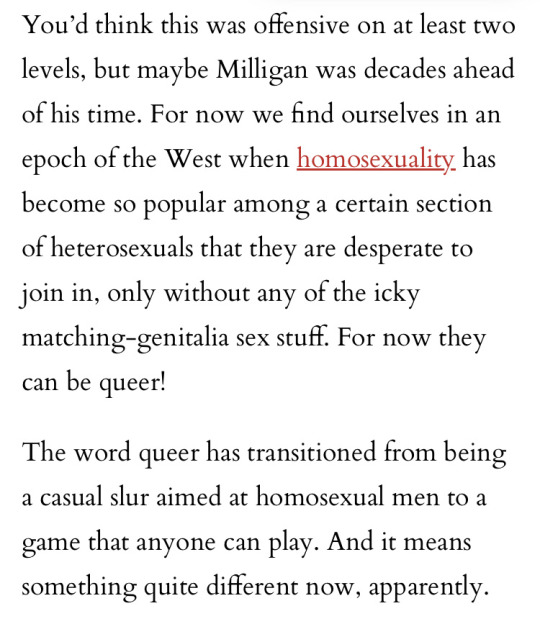
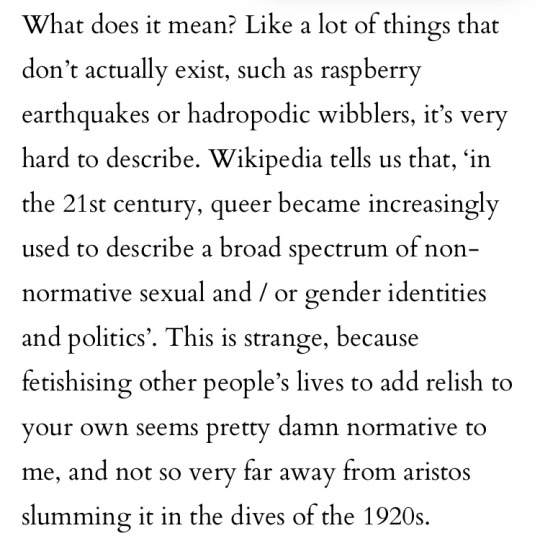


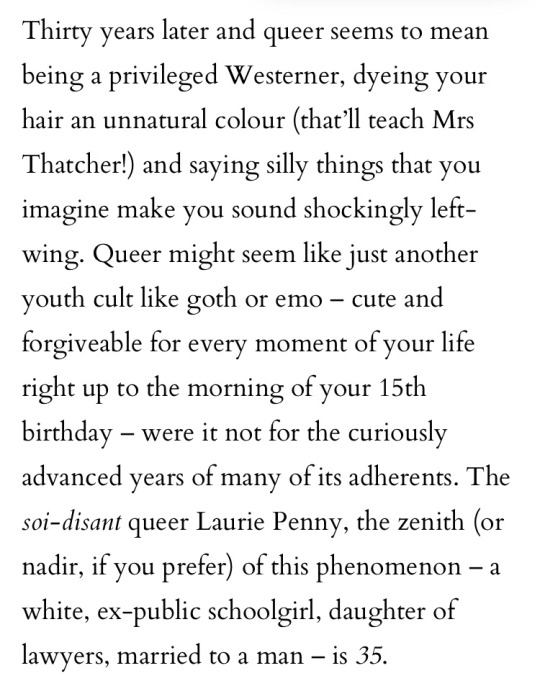
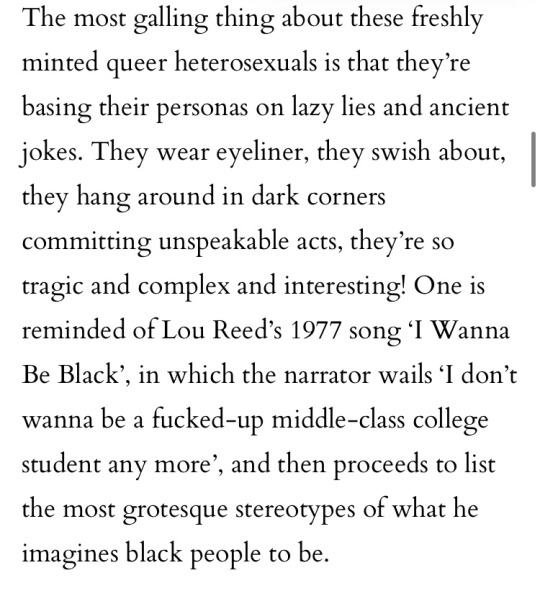
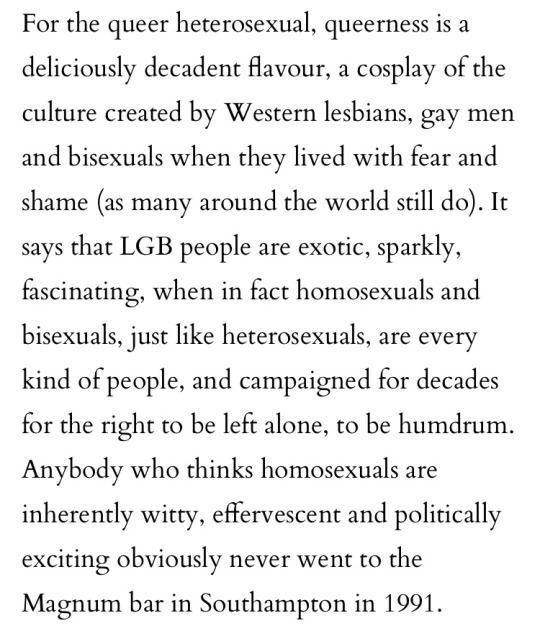
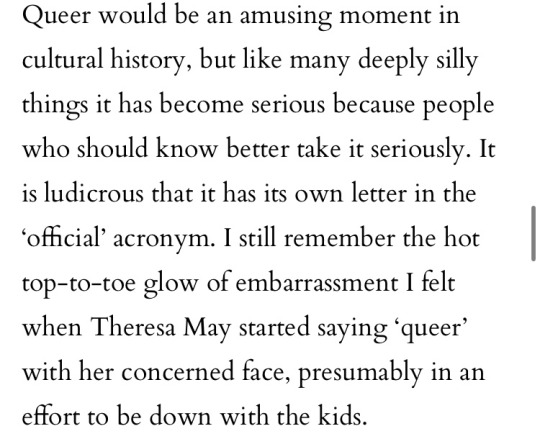
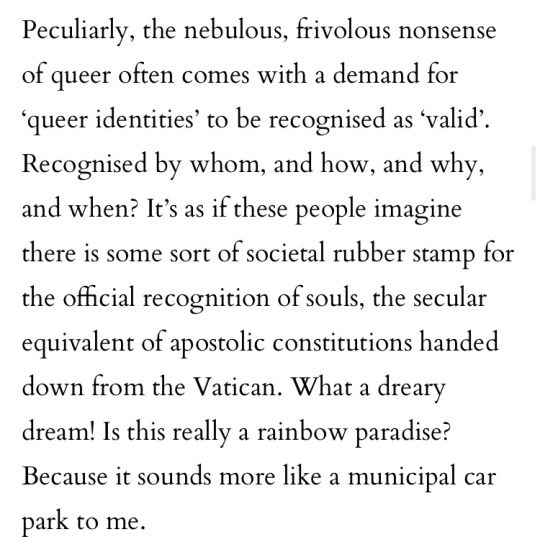
1K notes
·
View notes
Text
By: Helen Dale
Published: Apr 29, 2024
A new book raises tough questions about the history of gay liberation
Trans activism has caused bitter divisions within the gay rights movement
Medical professionals responding incorrectly to gender nonconformity has dire consequences
When scriptwriter Gareth Roberts was 14, he called a helpline promoted by a new organisation, one dedicated to helping gay and lesbian youth. The operator tried to set him up on a date with a 19-year-old. Fortunately, the young Roberts had the wit to realise this ‘was a very bad idea’.
A related organisation opened the first – and, at the time, only gay youth club in the country. Roberts joined, only to discover meeting rooms and communal areas littered with literature from PIE. That, for readers who aren’t gay or lesbian and of a certain vintage, stands for ‘Paedophile Information Exchange’.
What you need to understand – as Roberts argues in his first book, Gay Shame: The Rise of Gender Ideology and the New Homophobia – is ‘that there was a prominent streak of gay activism that was absolutely insane’. And, despite major successes borne of both a mature response to the AIDS crisis and opposition to Section 28, the bonkers quality never went away. That said, he admits he didn’t expect ‘the gay rights movement transmogrifying into a cross between the Church of Scientology, Heathers: the Musical and Act 4 of The Crucible’.
In Gay Shame, Roberts does two things. First, he explains how and why trans activism has become the ‘official’ gay rights movement that now (bitterly) divides gays and lesbians. It’s impossible not to notice the extent to which fights over trans issues often involve two opposed teams of homosexuals: Stonewall vs LGB Alliance. Roberts is a gay man and directs ordnance (for the most part) at gay men while also contextualising this division in an intelligent way. However, when feminist and lesbian adherents of the religion he calls ‘genderism’ cross his radar, they cop a similarly witty serve.
Secondly – and in a way that tracks the careful evidence-gathering of the Cass Review – he conveys the extent to which transgenderism represents ‘transing the gay away’. Most of the children who went through the Tavistock – 9,000 of them in all according to Cass – were same-sex attracted or simply gender nonconforming. Rising numbers, year-on-year, of glittery, swishy little boys and even more sporty but quirky little girls.
‘This is an ideology,’ Roberts points out in a coruscating passage, ‘that says there is something wrong with camp little boys and butch little girls and that they need to be fixed’.
This is impressive despite its grimness. Gay Shame only came out last Thursday, and – due to typical lead-times in publishing – was written in 2023. Despite a stint as a writer for Dr Who, Roberts didn’t nick the Tardis and get early access to the Cass report. This care and foresight has the effect of forcing readers – both heterosexual and homosexual – to think about how we respond to gender nonconforming behaviour.
Most people do not understand what it’s like to be gender nonconforming or appreciate the extent to which gender nonconforming people stick out like sore thumbs. Gays, lesbians and bisexuals won social acceptance before everyone else properly ‘got’ us. Roberts’ hands must be a mess, because he grasps every bloody nettle on the gay male side of the equation: from the extent to which gay male sexuality is utterly unlike straight male sexuality (because it does not involve women) to taking aim at a string of overpraised, low-quality gay male contributions to popular culture.
Does that mean every gay man on the planet sleeps around and adores Eurovision? No, of course not, but there are also no lesbian chemsex parties and heterosexuals really don’t have to pretend Eurovision is bloody marvellous. Meanwhile, if a straight man wanted some sort of chemsex equivalent, it would involve handing over a lot of cash to a group of women he doesn’t know in icky bits of London he would prefer not to frequent.
This absence of theory of mind – common but not universal when dealing with people unlike oneself – has implications. In a discussion of what he concedes is ‘a small minority of gay men,’ Roberts observes how ‘the Metropolitan Police’s shockingly inept handling of the case of the serial rapist and murderer Stephen Port in London in 2014/15 was partly down to their assumptions about the chemsex deaths of gay men’.
Of value is Roberts’ account of what he calls ‘the fall of Stonewall’, which was, in retrospect, astonishingly swift. ‘You can literally narrow it down to about three weeks in late 2014,’ he told me last week. He documents the extent to which Stonewall’s pivot to trans activism arose in part because it fell for queer theory (‘peer review is the process by which academics mark each other’s homework,’ he observes, tartly) and partly because it had won. ‘What was Stonewall for?’ Roberts asks. ‘It had no active political campaigns left to fight in the UK. But it had a huge staff, and a massive engine room of fundraising and campaigning machinery. A tender full of coal and no track’.
One effect of Stonewall’s pivot – and later persecution, along with Mermaids, of the LGB Alliance – was that the latter organisation spent years fighting off attacks on its charitable status, unable to do much else. Only recently has it been able to work normally, ‘doing,’ as Roberts says, ‘exactly the same work as Stonewall did before its fall to genderism’.
Gay Shame raises all sorts of difficult questions. It’s really striking, for example, what a recurrent feature the sexualising of children is within allegedly ‘liberatory’ streams of thought. This manifests in something Roberts calls ‘The Leap’. The Leap consists of the belief that ‘people (including, incredibly, children) are always what they claim to be, rather than what they are’.
Roberts’ discussion of gay men and gay male sexuality – and of male and female gender nonconformity more widely – also serves to remind the rest of us that we know very little about homosexuality. I know loads of ‘right-on’ straight parents who bought their son girl toys or their daughter boy toys. The kids simply blew them off. This, I’m afraid, is because most children are gender conforming. Gender has biological roots: the stereotyped behaviours it produces mean that deviations are really going to show. The thing is, gender nonconforming behaviour and the homosexuality and bisexuality that often accompany it also have biological roots, but we don’t know why.
In biology, a spandrel is a phenotypic trait that’s a by-product of some other evolved characteristic, rather than a direct product of adaptive selection. It’s a term borrowed from cathedral architecture, where it refers to something decorative, but which provides no structural support. Maybe some homosexuals don’t mind the idea that we’re just the fancy bit at the corner of an arch, but we’re too common to be an evolutionary spandrel. We exist for a reason. Why would evolution throw up a group of people of both sexes who are attracted to their own sex? Not exactly going to contribute to reproducing the species, are we?
Gareth Roberts isn’t sure that ‘genderism’ will collapse. At the end of Gay Shame, he presents two plausible scenarios. One depicts a world where queer theory and all its works and all its ways has gone down the long slide and all seems well. The other shows what things look like in the event of a genderist win. And in that world, the grim joke that emerged among staff at the Tavistock has come true. There are no gay people left.
#Helen Dale#Gareth Roberts#homosexuality#bisexuality#gay conversion therapy#gay conversion#gay rights#genderism#gender ideology#gender identity ideology#gay not queer#queer theory#intersectional feminism#gender nonconforming#gender non conforming#trans the gay away#medical scandal#medical corruption#religion is a mental illness
9 notes
·
View notes
Text
If you want to hate a Doctor Who writer, you can do better than Steven Moffat, who is not as bad as everyone told you in 2012, hate gareth roberts instead, the biggest piece of shit to have ever worked on Doctor Who
57 notes
·
View notes
Text
In future will there be content warnings on the TV and films made nowadays? If sanity prevails (and that’s a big if), what might such warnings look like? Perhaps something like this:
The ethnic origin of some historical figures may be incorrectly portrayed for DEI purposes, as was commonly done at the time this programme was made. This patronising practice was wrong then and it is wrong now.
This film was made at a time when characters were assigned virtue or villainy on the basis of their race or other identity characteristics. This is obviously deeply offensive and discriminatory and we do not support it.
This TV show contains heavy-handed ‘messaging’ that was intended to close down debate and normalise the crank belief that there are somehow more than two sexes, and that human beings can change sex. These outdated attitudes belong to the past.
This content is from a time when writers were constantly policed by social media and by other writers using the now-discredited theories of ‘lived experience’ and ‘positive representation’. Content creators were not allowed, or were afraid, to use their imagination and instincts to write characters and situations. Some viewers may find this offensive.
This content was made in the 2020s, when it was thought that good writing is showing that the Right People are Good, and the Wrong People are Bad. It also contains puerile attempts to shock and disorient the viewer. Viewer discretion is advised.
This content contains a warning about its content. It was made at a time when idiots presumed the morality of every piece of fictional behaviour depicted was endorsed by the channel that funded it and screened it.
And of course:
This film was made in the 2020s – and therefore it does not accurately reflect those times, or indeed any time in history.
2 notes
·
View notes
Text
On December 3rd, 1926 the mystery writer Agatha Christie is staying at a country estate and confronted to solve a real murder mystery (professor peach, in the library with a lead pipe) along with a party crasher known as the Doctor (Doctor 10) and his companion Donna. Unlike the murders in her stories, this one appears to be committed by a giant wasp disguised as a man. This adventure happened on the date she historically (in real life) disappeared for a week and half. ("The Unicorn and the Wasp" Doctor Who, TV)

#nerds yearbook#sci fi tv#time travel#dr who#doctor who#doctor 10#10th doctor#david tennet#donna noble#catherine tate#bbc#agatha christie#graeme harper#gareth roberts#fenella woolgar#felicity kendal#tom goodman hill#christopher benjamin#felicity jones#adam rayner#december#1926#timelord#david quilter#bee#alien#daniel king#ian barritt#leena dhingra#charlotte eaton
14 notes
·
View notes
Text
Round One, Group Ten
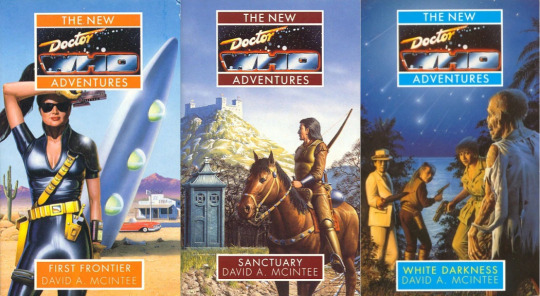
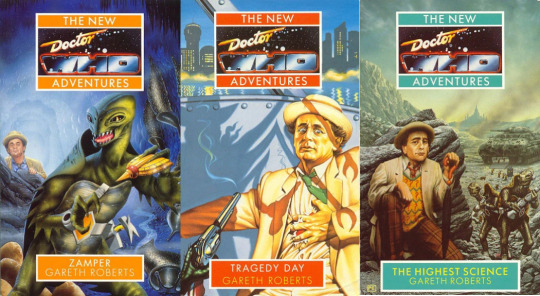
8 notes
·
View notes
Text
I understand the valid criticisms of the “not exactly white”/ “just walk about like you own the place” scene in The Shakespeare Code, that was poorly handled. But one thing that seems really idiotic is when people criticise it for the two lines that praise JK Rowling.
Firstly, the episode came out in 2007 when the Harry Potter books were at the height of their popularity, so to say that a line praising their author was controversial is some pretty blatant revisionist history. Secondly, though in subsequent years both Rowling and the episode’s writer Gareth Roberts have been cancelled, at the time of airing that was still way off for both of them. Unless you were sitting there watching it 2007 going “I’ve got a feeling these two are gonna end up on the wrong side of a culture war in ten years’ time”. Roberts was just a TV writer and Rowling was just the Harry Potter woman.
Thirdly, all the Doctor says is “wait til you read book 7... I cried”, a pretty straightforward praising of the quality of her writing. I can see why “Good old JK!” would rankle if you don’t like the author, but again in the context of the scene it’s more about Harry Potter than Rowling. It wasn’t some sort of dog whistle for the TERF-Illuminati.
It’s not like I love the episode, I think it’s alright. I’m just sick of people ignoring 99% of it and acting like the whole thing’s ruined because the Doctor said a nice thing about the mean witch lady. Or worse still, devaluing the valid criticisms of its handling of race by conflating them with petty criticisms of the JKR stuff.
As for the “it’s political correctness gone mad” joke... I’m not offended, I just don’t get it.
#my post#opinions#doctor who#doctor who series 3#the shakespeare code#tenth doctor#david tennant#freema agyeman#martha jones#gareth roberts#jk rowling#harry potter
9 notes
·
View notes
Video
youtube
Sarah Jane Confronts the Trickster | Whatever Happened to Sarah Jane? | The Sarah Jane Adventures
After being torn out of reality, Sarah Jane confronts the mysterious Trickster that caused her disappearance.
Subscribe to The Sarah Jane Adventures for more videos: http://bit.ly/SubscribeToSarahJane
#youtube#Elisabeth Sladen#Sarah Jane Smith#The Sarah Jane Adventures#Doctor Who#BBC Studios#CBBC#Tommy Knight#Luke Smith#Yasmin Paige#Maria Jackson#Daniel Anthony#Clyde Langer#Andrea Yates#Jane Asher#The Trickster#Pantheon of Discord#Graske#Gareth Roberts
13 notes
·
View notes
Text
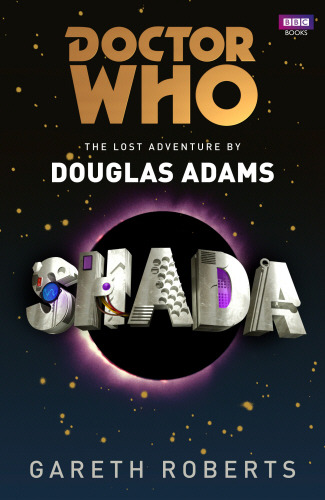
Doctor Who: Shada by Gareth Roberts
Rating: ❤️❤️❤️❤️❤️
4 notes
·
View notes
Text
Virgin Missing Adventures Reviews: The Well-Mannered War by Gareth Roberts (or, "Darkness Grows Uncivilised")
I'm free of talking about Gareth Roberts, the miserable transphobic bastard!
Wait, Trevor Baxendale who?
Regardless, that's all in the future. For the present, be sure not to miss the epic, show-stopping conclusion to the Missing Adventure reviews, only on Dale's Ramblings!
0 notes
Text
The Highest Science
Hoo boy. This one is... complicated. Spoilers and *eugh* Gareth Roberts below.
Unfortunately, G*reth R*bert's first foray into novels isn't too bad. And even back then there was a weird stance on gender in his writing. The Chelonians are a hermaphrodite species that goes exclusively by male pronouns but calls parents and children mother and daughter that are both fleshed out and some of the easiest characters to sympathise with, but they also kill anything that they consider gets in the way of them eating and breeding, so... it's extremely conflicting knowing his views. Most of the sidecast isn't very memorable, especially the stranded humans, though the previously mentioned Chelonians and the Cell are interesting. The last part of it though is very forgettable. Even though I listened to it, I didn't remember a thing about the audio, but the twist about the planet not being Sakkrat I saw a mile away. The best parts by far are those in the Chelonian perspective, a lot of the rest is much less interesting and the titular ‘highest science’ I literally could not have cared less about.
It’s average.
6.5/10
#gareth roberts#is a transphobe and that's tagged so you don't have to read this#virgin new adventures#seventh doctor#bernice summerfield
0 notes
Text
S3 E2: "The Shakespeare Code"
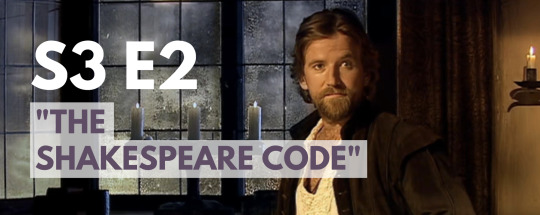
The Doctor takes Martha to London in 1599, where William Shakespeare's new play is being used by three witches in an evil plan.
Episode: S3 E2: "The Shakespeare Code"
Date: April 7, 2007
Writer: Gareth Roberts
Director: Charlie Palmer
Doctor: 10th
Companion: Martha Jones
–
Initially I thought this episode was cringe af, and some of the acting and writing towards the beginning was a bit questionable, but luckily, it got a lot better. Still not the best episode, but it was fun! Plus, another episode that tries to fill in some of the gaps in history – in this case, why Love's Labour's Won, Shakespeare's follow-up play to Love's Labour's Lost, was lost forever.
I enjoyed the characterisation of Shakespeare; instead of making him into a shiningly perfect example of a man, they showed his flaws, his slight arrogance, and his constant stealing of other people's phrases for his works. Obviously we don't know exactly how Shakespeare was in real life, but this is close to how I'd imagine him to be!
I don't have a lot to say about this one. It was fine :)
⬅️ Previous episode: S3 E1: "Smith and Jones"
➡️ Next episode: S3 E3: "Gridlock"
1 note
·
View note
Quote
High-status progressives are always going to have more money and more influence, and, frankly, there are just so many of them in the creative sector across the Western world. Asking the TV industry of the 2020s to be less bum-clenchingly orthodox is aiming, I think, for the impossible, no matter how many actual viewers fail to be beguiled. We’ve been waiting about a decade now for cold, hard commercial reality to overturn the dismal social-justice angle on pop culture, and there have been many false dawns
Gareth Roberts, Why we’re all cancelling Netflix
#wokeness#quotes#netflix#gareth roberts#doctor who#ricky gervais#dave chappelle#political correctness
1 note
·
View note
Text
With the immense aid of @orbitalpirate, I present to you the Season 2 Players.
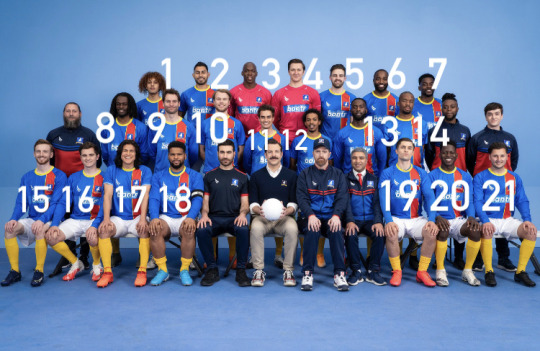
1 Kukoč (No 7) - Reserve Right Midfielder
2 Tyler Shannon (No 27) - Reserve Center Midfielder
3 Thierry Zoreaux (No 81) - Goalkeeper
4 Tom O’Brien (No 1) - Reserve Goalkeeper
5 Jack Dawkins (No 15) - Reserve Center Midfielder
6 Declan Cockburn (No 19) - Reserve Forward
7 Robbie Roberts (No 16) - Reserve Forward
8 Tommy Winchester (No 4) - Reserve Center Back
9 Paul Reynolds (No 20) - Reserve Center Back
10 Jan Maas (No 13) - Center Back
11 Richard Montlaur (No 8) - Center Midfielder
12 Moe Bumbercatch (No 21) - Center Midfielder
13 Kyle McCracken (No 28) - Reserve Forward
14 Gareth Canterbury (No 3) - Reserve Left Back
15 Jeff Goodman (No 17) - Left Back
16 Colin Hughes (No 12) - Left Winger
17 Dani Rojas (No 14) - Striker
18 Isaac McAdoo (No 5) - Captain & Center Back
19 Jamie Tartt (No 9) - Striker
20 Sam Obisanya (No 24) - Right Winger
21 Arlo Dixon (No 2) - Right Back
(Not numbered, but that is Coach Armada to the left in the second row. He shaved that beard off for season 3.)
#ted lasso#kukoč#tyler shannon#thierry zoreaux#tom o'brien#declan cockburn#jack dawkins#robbie roberts#tommy winchester#paul reynolds#jan maas#richard montlaur#moe bumbercatch#kyle mccracken#gareth canterbury#jeff goodman#colin hughes#dani rojas#isaac mcadoo#jamie tartt#sam obisanya#coach armada#coach beard#willis beard#roy kent#nathan shelley#nate shelley#will kitman#arlo dixon
422 notes
·
View notes
Text
oh RTD you cis little man you. your trans allegories are so quaint
#Doctor who#baby’s first transgenderism#but hey at least this has definitely pissed off gareth Roberts#wireupthetalk
220 notes
·
View notes